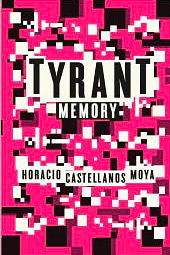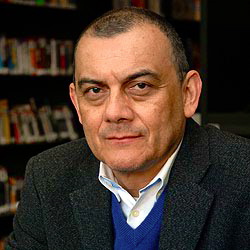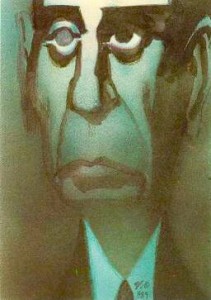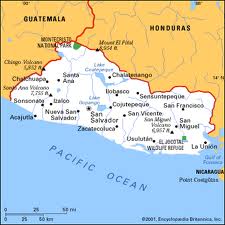“The general is a theosophist, he holds séances, he believes in invisible witch doctors, and he demands that his close circle of friends call him ‘maestro.’ At first, people respected his eccentricities, but ever since he began to give lectures every Sunday in the auditorium of the university, broadcasting them over the radio, we realized that ‘the man’ isn’t in his right mind.”
 In Tyrant Memory, Horacio Castellanos Moya’s fourth novel to be translated into English, the author once again speaks out courageously about repression, abuses of power, military dictatorship, and cold-blooded executions in Central America, this time setting his novel in El Salvador in 1944. General Maximiliano Hernandez Martinez, a fascist known in the novel as The Warlock, had come to power in a coup led by the military in 1931, and was still holding the country in an iron grip in 1944. Believing that a communist conspiracy is underway in the capital of San Salvador, he uses the power of his army to clamp down on individual freedoms and terrorize his citizens into submitting to his gross abuses of human rights. Dona Haydee Aragon, the middle-aged wife of Pericles Aragon, becomes the first person narrator of the events that eventually culminate in a general strike aimed at the general’s removal.
In Tyrant Memory, Horacio Castellanos Moya’s fourth novel to be translated into English, the author once again speaks out courageously about repression, abuses of power, military dictatorship, and cold-blooded executions in Central America, this time setting his novel in El Salvador in 1944. General Maximiliano Hernandez Martinez, a fascist known in the novel as The Warlock, had come to power in a coup led by the military in 1931, and was still holding the country in an iron grip in 1944. Believing that a communist conspiracy is underway in the capital of San Salvador, he uses the power of his army to clamp down on individual freedoms and terrorize his citizens into submitting to his gross abuses of human rights. Dona Haydee Aragon, the middle-aged wife of Pericles Aragon, becomes the first person narrator of the events that eventually culminate in a general strike aimed at the general’s removal.

Castellanos Moya does a remarkable job of conveying the personality of Dona Haydee, carrying her vanity and lack of real interest in politics to a satiric extreme, while, at the same time, conveying the very real horrors that occur in the spring of 1944. To counter rumors of a possible coup, the General has taken the “precautions” of arresting army officers who might be part of it, along with students, journalists, and intellectuals. As the novel opens, it is March 24, 1944, and Dona Haydee’s husband Pericles has been arrested and imprisoned in the “Black Palace.” Pericles is a journalist who had formerly been an ambassador under the general, and he has not been involved in the plot. Since this is Holy Week, Dona Haydee is convinced he will be released in time for Good Friday observations.

Gen. Maximiliano Hernandez Martinez, known as "the Warlock," by Bill Sienkiewicz
As the days tick by, Dona Haydee writes of events in her diary, and the reader comes to know the many members of her large family, their political persuasions, and their plans for the future. All agree, however, that Pericles’s sudden transfer to the Central Prison, famous because so many rural prisoners have “inexplicably” disappeared from it, indicate that things have taken a serious turn for the worse. Dona Haydee finds that she cannot visit him at will, cannot bring him his food on a daily basis, and cannot use their numerous connections to make his life easier there. When the rumored coup finally takes place, Pericles is still in jail, though it affects other members of Dona Haydee’s family, notably Clemen, her son, a news-reader on the major San Salvador radio station, who delightedly, and drunkenly, falsely announces the General’s death. Clemen and his more militant cousin Jimmy end up on the run from the military, ultimately hiding in a remote mangrove swamp to avoid discovery.
At this point, the novel becomes a two-part dialogue, with Dona Haydee writing her casual and chatty diary about what is happening in her life in San Salvador, while the two fugitives provide commentary on their own activities, often very funny, even farcical, as they try to avoid the military who have them on their deathlist. Part III takes place in 1973 and brings the fates of the various characters up to date.

The author creates some sympathy for Dona Haydee, who, despite her personal failings, has a good heart and truly loves her husband, and he leavens the narrative with absurdities and ironies as she tries to deal with her husband’s plight. She feels real, and her apolitical stance sets the General’s revenge on the plotters into sharper relief. In the midst of the coup, she has dinner at the Casino with her mother, who cheers her up with a “strong aperitif,” after which, she records, they had a “delicious paella” and an “exquisite guava tart.” When someone she knows is wounded, she knits a baby dress. When a friend drops by after lunch to discuss the latest executions, they drink coffee and eat cemita cakes “while facing the garden.” And when a close friend’s husband is executed, Dona Haydee “felt like something the cat dragged in, and I did not want to show up at the wake looking like that,” so she goes to the beauty parlor to get her hair done.
 All this shows the clear separation of roles between men and women at this time, but it also puts the horrors into ironic perspective. The fugitives—Dona Haydee’s silly son Clemen and his much more serious cousin Jimmy—add to the picture of daily life as they try to avoid the military searchers, and at one point, when they enlist the aid of a friendly priest, the novel hits its true comic high point. Eventually, however, the minutiae of Dona Haydee’s daily life become a bit wearing, at least for me, and I found myself longing to know more about the serious points of view of the Warlock and his military vs. the points of view of a vibrant local population. I was curious about Pericles’ interest in communism and wondered how influential a movement that had been. At the same time, I was glad to be spared a succession of horrors committed in retribution for the coup attempt. The author does succeed in raising interest in the history of El Salvador for readers who may be unfamiliar with its tumultuous background, and he wisely recognizes the advantage of standing apart and letting the reader discover new information without polemics and horror tales in this memorable and unusual novel from Central America.
All this shows the clear separation of roles between men and women at this time, but it also puts the horrors into ironic perspective. The fugitives—Dona Haydee’s silly son Clemen and his much more serious cousin Jimmy—add to the picture of daily life as they try to avoid the military searchers, and at one point, when they enlist the aid of a friendly priest, the novel hits its true comic high point. Eventually, however, the minutiae of Dona Haydee’s daily life become a bit wearing, at least for me, and I found myself longing to know more about the serious points of view of the Warlock and his military vs. the points of view of a vibrant local population. I was curious about Pericles’ interest in communism and wondered how influential a movement that had been. At the same time, I was glad to be spared a succession of horrors committed in retribution for the coup attempt. The author does succeed in raising interest in the history of El Salvador for readers who may be unfamiliar with its tumultuous background, and he wisely recognizes the advantage of standing apart and letting the reader discover new information without polemics and horror tales in this memorable and unusual novel from Central America.
Note: Author Horacio Castellanos Moya, born in Honduras, raised in El Salvador, and exiled from much of Central America, has been resettled in the United States under a program of The City of Asylum in Pittsburgh, which “provides sanctuary to writers exiled under threat of death, imprisonment, or persecution in their native countries.” (Author Russell Banks was President of this organization for many years.) Castellanos Moya is now an Assistant Professor in the Department of Spanish and Portuguese at the University of Iowa.
Photos, in order: The author’s photo appears on http://dreamantilles.blogspot.com
The cartoon painting of Maximiliano Hernandez Martinez, by Bill Sienkiewicz, appears on http://home.iprimus.com.aul
The lovely painting of a mangrove swamp, similar to where Clemen and Jimmy hide, is by Khalid Ipda: http://www2.ambientdesign.com
San Salvador is near the center of El Salvador. Cojutepeque, the rural town where Pericles’ parents live, is east of San Salvador, in the mountains. http://www.merriam-webster.com
ALSO by Castellanos Moya: SENSELESSNESS, THE SHE-DEVIL IN THE MIRROR, and THE DREAM OF MY RETURN
